#Coco coco peat
Explore tagged Tumblr posts
Note
I need you to know, I am getting a centipede because I keep seeing yours on my dash.
(don't worry though, I'm an experienced bug keeper and did the research to know what I'm getting into, your posts definitely tipped the scales though)
i'm so happy to hear that! how exciting! :D what species are you thinking of getting??
if you'd like any advice or tips on their care do let me know, i'd be happy to help and if you have questions that i can't answer i can put you in touch with people who are way more experienced than me. <3
+ gyomei for tax

#asks#yippeee!#i'm sure you know already if youve done loads of research but just in case:#they need good cross-ventilation at the bottom of their enclosure#NO COCO FIBER/COIR!!!! best go-to is sand mixed with peat or topsoil#remove uneaten food/leftovers asap as buildup of gases is bad for them#one side can be sprayed to keep it damp and the other dry#always provide a water dish#you have to walk a fine line between mycosis and dessication with pedes unfortunately. it can be a little daunting at first#too wet/stagnant = mycosis breeding ground#too dry/no water dish = dessication#a varied diet is best#crickets superworms roaches copper-free cat food and raw meats are all fine
4 notes
·
View notes
Text
whoever said coco coir is a great growing medium lied
#everything i grow in it dies and molds and it dries up too quickly#i want to like it. i really do. i want coco coir to work vs the fucking peat soil. but. it just doesnt
5 notes
·
View notes
Text



5/4/24 ~ Some new stuff I’m using this year. I’ve never used Coco Coir before today & I loooove it! So much product in a compact lil brick! And it’s repurposed natural material, so win win. I still used a little bit of my seed starting mix to mix in with it just because that’s all I know 😅😆
But I’m learning about the different medias/compost for planting!
I also got a bag of worm castings. Mixed some of it in there as well. We shall see how it does!
What do you use to mix in your media?
#soil health#soil#soil testing#horticulture#worm castings#coco coir#peat moss#compost#compost garden#organic matter#kiss the ground#microbes#indoor garden#sustainable gardening#container gardening#vegetable gardening#starting seeds#growing food#plant life#plant mom#veganuary#homesteading#gardening tips#organic garden
6 notes
·
View notes
Text
Coco Coir Pots
Title: Harnessing the Green Magic of Coco Coir Pots for Sustainable Gardening
Introduction: Coco coir pots, the eco-friendly alternative to traditional plant containers, are taking the gardening world by storm. These biodegradable pots, derived from coconut husk fiber, offer numerous benefits for both garden enthusiasts and the environment. In this blog post, we'll delve into the world of coco coir pots exploring their many advantages and how they contribute to sustainable gardening practices.
Understanding Coco Coir Pots: Coco coir pots, also known as coir pots or coir planters, are made from coconut coir, a natural fiber extracted from coconut husks. Unlike plastic or clay pots, coco coir pots are biodegradable and have a unique ability to enhance plant growth.
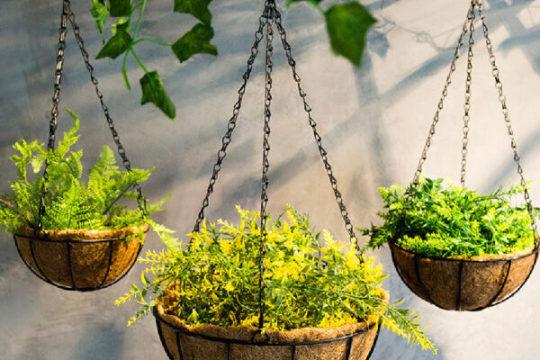
Advantages of Coco Coir Pots: Let's explore some of the key benefits of using coco coir pots in your gardening endeavors:
Biodegradability: One of the most significant advantages of coco coir pots is their biodegradability. These pots break down naturally over time, eliminating the need for disposal and reducing environmental waste.
Reduced Transplant Shock: When it's time to transplant your seedlings or young plants, you can plant the entire coco coir pot directly into the soil. This reduces transplant stress and minimizes root disturbance, ensuring a smoother transition for your plants.
Improved Aeration: The porous nature of coir promotes aeration and air pruning of roots. This leads to healthier root development, as roots are encouraged to grow within the pot and not become root-bound.
Enhanced Moisture Retention: Coco coir is excellent at retaining moisture, which means you won't need to water your plants as frequently. It provides a consistent and steady supply of moisture to the roots.
pH Neutral: Coco coir has a neutral pH level, making it suitable for a wide range of plants. You can easily adjust the pH to match specific plant needs.
Eco-Friendly Alternative: Choosing coco coir pots supports eco-friendly gardening. By opting for biodegradable containers, you reduce plastic waste and minimize the environmental impact of traditional plastic pots.
Versatility: Coco coir pots come in various sizes, making them suitable for different types of plants, from small seedlings to larger ornamental trees. They can be used in both indoor and outdoor gardening.
youtube
Additional Uses of Coco Coir Pots: Coco coir pots aren't limited to just planting. Here are some other applications:
Mulching: Coir pots can be used as mulch. When placed on the soil's surface, they help retain moisture, regulate soil temperature, and reduce weed growth.
Composting: When your coco coir pots are no longer needed, you can add them to your compost pile. They'll break down and enrich the compost with organic matter.
Craft Projects: The natural texture and appearance of coco coir make it a great material for various craft and art projects. Get creative and use coir in your DIY endeavors.
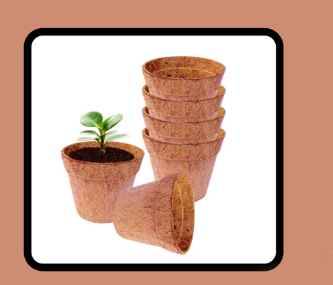
Conclusion: Coco coir pots are a game-changer for sustainable gardening. Their biodegradability, reduced transplant shock, and ability to improve plant growth make them a valuable asset for gardeners. By choosing these eco-friendly alternatives to traditional plant containers, you not only promote healthier plant growth but also contribute to a greener and more sustainable future. Whether you're an avid gardener or just starting out, consider making the switch to coco coir pots and witness the green magic they bring to your garden.
#Coir Dust#Coir Pith#Coco Peat#Long Type Grow Bag#Grow Slab#Coconut Coir Pith#Coir Pith Near Me#Pith Coconut#Coco Pith Near Me#Coir Fibre Pith#Coconut Husk Pith#Coco Coir Pots#Coco Soil#Coconut Fiber For Plants#Coco Pot#Coir Pots For Plants#Peat Grow Bags#Youtube
2 notes
·
View notes
Text
2 notes
·
View notes
Text
Nathan Coir: Leading Coco Peat Manufacturer in India for Quality & Sustainability
Introduction
When it comes to high-quality coco peat and potting mix, Nathan Coir stands out as one of the leading coco peat manufacturers in India. With years of expertise, cutting-edge technology, and a commitment to sustainability, Nathan Coir has earned a strong reputation in the industry. Whether you are looking for premium-grade coco peat manufacturers in Tamil Nadu or reliable coco peat suppliers in India, Nathan Coir is the trusted name to meet all your requirements.
About Nathan Coir
Nathan Coir is a well-established company specializing in the production of coco peat-based products. With a strong presence in both domestic and international markets, the company ensures the highest standards in manufacturing and distribution. As one of the top coco peat manufacturers in Tamil Nadu, Nathan Coir sources the finest raw materials to create eco-friendly, durable, and high-performance products.
Our Product Range
1. Coco Peat Powder
Nathan Coir provides high-quality coco peat powder, an excellent soil conditioner used in gardening, horticulture, and agriculture. Being a leading name among coco peat manufacturers in India, we ensure premium quality for optimal plant growth.
2. Coco Peat Blocks
As one of the premier coco peat manufacturers in Tamil Nadu, Nathan Coir specializes in coco peat blocks, available in various sizes and designed for use in agricultural and hydroponic applications.
3. Potting Mix
Nathan Coir also offers high-quality potting mix, a perfect blend of coco peat and essential nutrients to support plant growth, making us a trusted coco peat supplier.
Why Choose Nathan Coir?
1. Superior Quality Assurance
As one of the most trusted coco peat manufacturers in Tamil Nadu, we adhere to strict quality control measures to ensure our products meet international standards.
2. Sustainable Manufacturing
Nathan Coir is committed to eco-friendly production. Our coco peat products are biodegradable and made using sustainable practices.
3. Competitive Pricing & Bulk Supply
Being one of the top coco peat manufacturers in India, we provide cost-effective pricing for bulk buyers without compromising quality.
4. Global Reach & Export Quality
Our products are exported worldwide, making us a leading coco peat supplier catering to international demands.

Conclusion
Nathan Coir is your go-to solution for all coco peat-based products. Whether you are searching for coco peat manufacturers in India, coco peat manufacturers in Tamil Nadu, or reliable coco peat suppliers, Nathan Coir delivers the best quality and service. Contact us today to learn more about our premium range of coco peat-based products!
#coco peat manufacturers in india#coco peat manufacturers in tamilnadu#coir manufacturers in india#coir products manufacturers
0 notes
Text

Coco coir yarn exporters in india
🌱 Sustainable, Strong, and Eco-Friendly! 🌱
Coco Coir Yarn is the perfect natural solution for your gardening, crafting, and home décor needs. 🌿
✅ Biodegradable ✅ Excellent water retention ✅ Mold-resistant
🌿 Use it for plant support, DIY projects, and more!
#Coco peat exporters in india#Coco peat growbag exporters in india#Coco coir yarn exporters in india#Pollachi semi husked coconuts exporter#Indian pollachi coconuts exporters#Fresh coconut exporters in india#Coco peat grow bag exporters & suppliers#Buffered Coco peat growbag exporters#Coir yarn exporters and suppliers in tamilnadu India
1 note
·
View note
Text
Find Reliable Coco Peat Manufacturers Near Me for Quality Products
What is Coco Peat?
Coco peat is a natural material made from the husk of coconuts. It is widely used in gardening and farming to help plants grow better by holding moisture and improving soil quality. Many people choose coco peat because it’s good for plants and the environment.
Why Choose Trusted Coco Peat Manufacturers Near Me?
When looking for coco peat manufacturers near me, it's important to pick trusted companies. These manufacturers make sure the coco peat you buy is of high quality, safe for the environment, and perfect for helping your plants grow strong and healthy.
Where to Buy Coco Peat Near Me?
To get the best coco peat, choose coco peat manufacturers near me. They offer affordable and eco-friendly products that are delivered quickly. Whether you’re gardening at home or farming, buying from a local manufacturer ensures you get good quality coco peat that works for your needs. So, look for coco peat manufacturers near me to find the best options available. For more detail contact: https://yubiindia.com/
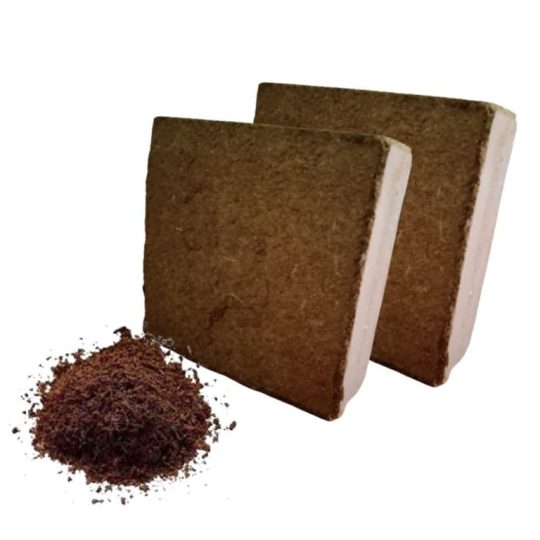
0 notes
Text
How Does Coco Peat Export from India Work?

Coco peat, also known as coir pith, is a versatile and sustainable growing medium made from the fibrous husks of coconuts. As global demand for eco-friendly and sustainable products increases, coco peat export from India has seen significant growth. India is one of the leading producers and exporters of coco peat, supplying this valuable resource to various countries around the world. But what does the export process entail? Who are the key players? In this article, we'll explore the ins and outs of coco peat export from India, dive into the coco peat export data, and identify the leading coco peat exporters in India.
Why is Coco Peat Export from India Important?
What Makes India a Leader in Coco Peat Export?
India is one of the largest producers of coconuts globally, providing an abundant source of raw material for coco peat production. The country's advanced processing facilities and expertise in converting coconut husks into high-quality coco peat make it a significant player in the global market. Coco peat is widely used in horticulture, agriculture, and gardening due to its excellent water retention, aeration, and soil conditioning properties. As more countries shift towards sustainable and organic farming practices, the demand for coco peat continues to grow, solidifying India's position as a major exporter.
How Does Coco Peat Benefit the Environment?
Coco peat is an eco-friendly product that helps reduce agricultural waste by utilizing the byproducts of coconut processing. It is a sustainable alternative to peat moss, which is harvested from peat bogs and contributes to environmental degradation. By promoting the use of coco peat, India not only supports sustainable agriculture but also reduces the carbon footprint associated with traditional farming practices.
Who Are the Leading Coco Peat Exporters in India?
Which Companies Dominate the Coco Peat Export Market?
India is home to several leading coco peat exporters who play a crucial role in supplying this sustainable product to global markets. Some of the key exporters include:
Fibredust LLC: Known for its high-quality coco peat products, Fibredust LLC exports to various countries, including the USA and Europe.
Allwin Coir: A prominent player in the industry, Allwin Coir exports coco peat to major markets, focusing on consistent quality and sustainable practices.
Coir Green: Specializing in organic and eco-friendly coco peat, Coir Green has established a strong presence in the international market.
Sivaguru Coir Products: This company exports a wide range of coir-based products, including coco peat, to countries across Asia, Europe, and the Americas.
These exporters are instrumental in driving the growth of coco peat export from India by maintaining high standards and catering to the specific needs of different markets.
What is the Role of Small-Scale Exporters in the Coco Peat Industry?
In addition to large-scale exporters, numerous small and medium-sized enterprises (SMEs) contribute to the coco peat export industry in India. These smaller exporters often focus on niche markets, offering customized products such as organic or finely processed coco peat. Their flexibility and ability to cater to specific customer demands make them an essential part of the industry, helping to expand India's reach in the global market.
How is Coco Peat Export from India Conducted?
What Are the Steps Involved in Coco Peat Export?
The process of coco peat export from India involves several key steps to ensure that the product meets international standards and reaches its destination in optimal condition:
Harvesting and Processing: Coco peat is extracted from coconut husks, cleaned, and processed to remove impurities. It is then compressed into blocks, bricks, or bags for easy transport.
Quality Control: Before export, the coco peat undergoes rigorous quality checks to ensure it meets the specifications of the importing countries. This includes testing for pH levels, electrical conductivity, and moisture content.
Packaging: The processed coco peat is packaged in a way that ensures it remains uncontaminated and retains its quality during transit. Packaging options include compressed blocks, loose-filled bags, and grow bags.
Documentation: Exporters must prepare and submit necessary documents, including certificates of origin, phytosanitary certificates, and commercial invoices, to comply with the import regulations of the destination country.
Shipping: Coco peat is shipped via sea or air, depending on the destination and the urgency of the order. Exporters work with reliable logistics partners to ensure timely delivery and maintain the product's quality during transit.
What Are the Challenges in Exporting Coco Peat?
Exporting coco peat from India comes with several challenges, including:
Quality Standards: Different countries have varying quality requirements for coco peat, which means exporters must adhere to specific standards to avoid rejection at the destination port.
Logistics and Shipping Costs: Transporting coco peat, especially in large quantities, can be costly. Exporters must carefully manage logistics to keep costs down while ensuring timely delivery.
Market Competition: With several countries producing and exporting coco peat, Indian exporters face stiff competition in the global market. Maintaining high quality and competitive pricing is essential for staying ahead.
What Does Coco Peat Export Data Reveal?
What Insights Can Be Gained from Coco Peat Export Data?
Coco peat export data provides valuable insights into the industry's trends, growth patterns, and market dynamics. According to recent data, India continues to be one of the leading exporters of coco peat, with significant exports to countries like the USA, the Netherlands, Australia, and South Korea. The data also highlights the growing demand for coco peat in countries that are increasingly adopting sustainable farming practices.
Which Are the Major Coco Peat Importing Countries?
The major coco peat importing countries include:
USA: One of the largest markets for Indian coco peat, driven by the growing demand for organic and sustainable gardening products.
Netherlands: As a global leader in horticulture, the Netherlands imports large quantities of coco peat for use in greenhouses and nurseries.
Australia: With its focus on sustainable agriculture, Australia is a key market for Indian coco peat.
South Korea: The demand for coco peat in South Korea is driven by the country's increasing adoption of eco-friendly farming practices.
The data also shows a steady increase in exports to emerging markets, indicating the expanding global footprint of Indian coco peat.
How Can India Strengthen its Position in the Global Coco Peat Market?
What Strategies Can Help Boost Coco Peat Export from India?
To strengthen its position as a leading exporter of coco peat, India can adopt several strategies:
Enhancing Product Quality: Investing in advanced processing technologies and quality control measures can help Indian exporters produce higher-quality coco peat that meets the stringent standards of international markets.
Expanding Market Reach: By exploring new markets in Asia, Africa, and South America, Indian exporters can diversify their customer base and reduce reliance on traditional markets.
Sustainable Practices: Emphasizing organic and sustainable production methods can appeal to environmentally conscious consumers and boost demand for Indian coco peat.
Collaborative Efforts: Partnering with international agricultural organizations and participating in global trade fairs can help Indian exporters showcase their products and expand their market presence.
How Important is Innovation in the Coco Peat Industry?
Innovation plays a critical role in the coco peat industry. By developing new products and improving existing ones, Indian exporters can cater to the evolving needs of global markets. For example, the introduction of coco peat-based grow bags and biodegradable packaging options has opened up new opportunities for exporters. Continuous innovation ensures that Indian coco peat remains competitive and relevant in the global market.
Conclusion
Coco peat export from India is a thriving industry that capitalizes on the country's abundant coconut resources and advanced processing capabilities. With growing demand for sustainable and eco-friendly products worldwide, India's position as a leading exporter of coco peat is set to strengthen. By focusing on quality, expanding market reach, and embracing innovation, Indian exporters can continue to meet global demand and maintain their competitive edge in the market.
FAQs
1. What are the main coco peat importing countries? The main coco peat importing countries include the USA, Netherlands, Australia, and South Korea.
2. How do coco peat exporters in India ensure product quality? Exporters ensure product quality through rigorous quality control measures, including testing for pH levels, electrical conductivity, and moisture content.
3. Who are some leading coco peat exporters in India? Leading exporters include Fibredust LLC, Allwin Coir, Coir Green, and Sivaguru Coir Products.
4. What challenges do exporters face in the coco peat industry? Challenges include meeting varying international quality standards, managing logistics and shipping costs, and competing in a crowded global market.
5. How can India maintain its leadership in coco peat export? India can maintain its leadership by enhancing product quality, expanding into new markets, focusing on sustainable practices, and fostering innovation in the industry.
#coco peat export from India#coco peat exporters in India#coco peat export#cocopeat export from India#coco peat export data#coco peat importing countries
0 notes
Text
Unlock the insights into the world of coco peat exporters, exploring key players and market trends. Discover the dynamics shaping the industry with Seair Exim Solutions.
#coco peat export#coco peat exporters#coco peat exporters in india#coco peat importers#coco peat export data#Coir Pith export data#Coir Pith exporters in india#Coir Pith exporters
1 note
·
View note
Text
https://www.seair.co.in/blog/coco-peat-export-from-india.aspx
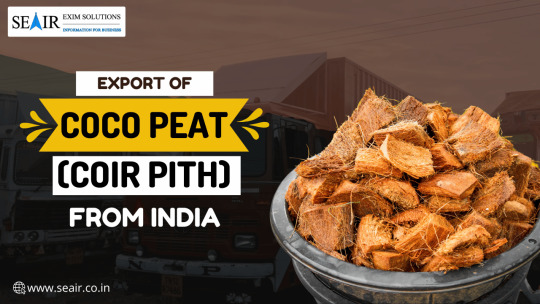
Explore comprehensive Coco Peat (Coir Pith) Export From India: in-depth Statistics on the Seair Exim Solutions blog. Discover trends, market analysis, and more to stay informed about this growing industry.
#coco peat export from India#coco peat export#coco peat exporters in india#coco peat export data#coco peat exporters#coco peat importers
0 notes
Text
Our Innovative Products | Wood Peat | Floreasy India Pvt Ltd
#garden #plants #innovation FLOREASY INDIA PVT LTD
"Grow green, grow smart. Choose Wood peat, a sustainable choice for a flourishing future.
" Our Innovative Product : WOODPEAT A Dry Substrate 100% Renewable Website: https://floreasyindiapvtltd.com/ Mail : [email protected] Contact: 63841 80344
WHAT IS WOOD WOOL AND THEIR USES
Wood wool , also known as Wood Mulch or wood Fiber, is a product produced when pine wood chip is extruded to obtain fibers. The process of production is happening at high temperature and pressure, this guarantee that no life is present in the final product, making it stable.
Wood Wool will be used as a first material in substrate (potting soil) it is blended across the world with other raw material in order to obtain a blend that we call substrate (=potting soil),in order to Grow plants. Finally, Wood wool in the form of 22.5 kg and opened with the help of bale opener and finally loosen wood wool to mix with cocopeat. Wood wool , also known as Wood Mulch or wood Fiber, is a product produced when pine wood chip is extruded to obtain fibers.
The process of production is happening at high temperature and pressure, this guarantee that no life is present in the final product, making it stable. Wood Wool will be used as a first material in substrate (potting soil) it is blended across the world with other raw material in order to obtain a blend that we call substrate (=potting soil),in order to Grow plants.
Finally, Wood wool in the form of 22.5 kg and opened with the help of bale opener and finally loosen wood wool to mix with cocopeat.
PRODUCTION PROCESS OF WOODPEAT
WOODWOOL + COCOPEAT=WOODPEAT
In India Wood wool will be blended with local coco peat and re-exported. The Wood wool will be mixed with coco peat in order to create a substrate (potting soil). Wood wool and coco peat are completely complementary on an agronomical point of view creating a balanced substrate perfect for the cultivation of many plants across the world.
#cocopeat #cocofiber #coirpith #sustainablegardening #ecofriendlygardening #gardening #plants #organicgardening #urbangardening #containergardening #raisedbeds #seedstarting #Compost2024 #improveddrainage #aeration #healthyroots #plantgrowth #nutrientrich #lightweight #convenient #easytouse #reusablegrowbags #cocopeatblocks #cocopeatbriquettes #cocopeattablets #cocopeatgrowbags #cocopeatcompost #cocoseedstarters #india #indiangardening #sustainableindia #ecofriendlyindia #floreasyindia #floreasysolutions #coirpower #gardeningtips #gardeninglife #gardener #plantlover #greenthumb #growyourown
0 notes
Text
How to Use Coconut Coir Pith in your Garden?
Using coconut coir pith, also known as coco peat or coir dust, in your garden offers several benefits, including water retention, aeration, and soil conditioning. Here's a step-by-step guide on how to use coconut coir pith effectively in your garden:
Procure Coconut Coir Pith:
Purchase coconut coir pith from gardening stores, nurseries, or online suppliers. It is commonly available in compressed bricks or blocks.
Rehydrate the Coir Pith:
Place the compressed coir pith bricks in a large container or tub.
Add water to the container, allowing the coir pith to absorb moisture and expand.
Allow the coir pith to soak in water for several hours or overnight until fully rehydrated.
Mix with Soil or Potting Mix:
Once fully rehydrated, fluff up the coir pith with your hands to loosen it.
Mix the rehydrated coir pith with your garden soil or potting mix in a ratio of 1:1 or as desired. Alternatively, you can use coir pith as a soilless growing medium.
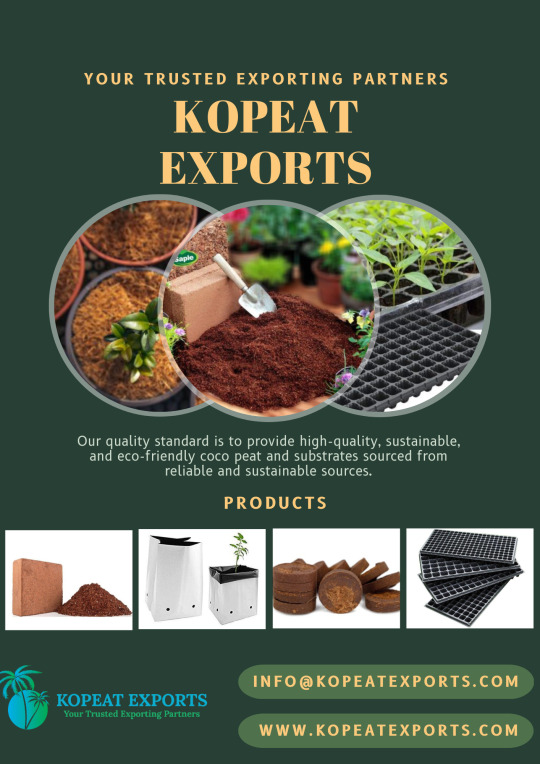
Use as Soil Amendment:
Incorporate the rehydrated coir pith into your garden soil as a soil amendment to improve its structure, moisture retention, and aeration.
Dig the coir pith into the soil to a depth of a few inches, ensuring even distribution throughout the garden bed.
Mulching:
Spread a layer of rehydrated coir pith on the soil surface around plants as mulch.
Mulching with coir pith helps conserve soil moisture, suppresses weed growth, and regulates soil temperature.
Seed Starting and Container Gardening:
Use rehydrated coir pith as a growing medium for starting seeds indoors or in seed trays.
Fill seed trays or pots with a mixture of coir pith and perlite or vermiculite for optimal seed germination and seedling growth.
Hydroponic and Aquaponic Systems:
Rehydrated coir pith can also be used as a growing medium in hydroponic and aquaponic systems.
Place the coir pith in growing containers or hydroponic trays and use it to grow plants without soil.
youtube
Watering and Maintenance:
Water your garden regularly to ensure adequate moisture levels, especially when using coir pith as a soil amendment or mulch.
Monitor the moisture levels in the soil and adjust watering as needed to prevent waterlogging or dryness.
Sustainable Disposal:
Coconut coir pith is a sustainable and biodegradable material. After use, it can be composted along with other organic waste to enrich the soil.
By following these steps, you can effectively use coconut coir pith in your garden to improve soil structure, retain moisture, and promote healthy plant growth.
#Coir Dust#coco coir pots#coco soil#coco peat#coir pots for plants#coco pith near me#coco pith#coco pot#coconut fiber for plants#coconut husk pith#coir fibre pith#Peat Grow Bags#Coir Pots For Plants#Coco Pot#Youtube
1 note
·
View note
Text
#garden #horticulture #Cococoir
1 note
·
View note
Text
Nathan Coir 5 Kg Cocopeat Block: The Best Organic Growing Medium at an Affordable Price
Introduction
Looking for the perfect growing medium for your plants? Nathan Coir’s 5 kg Cocopeat Block is the ideal choice for both home gardeners and commercial growers. Made from 100% natural coconut husks, our 5 kg coco peat block retains moisture, improves soil aeration, and enhances plant growth—all at an affordable price.
Whether you are growing vegetables, flowers, or hydroponic plants, Nathan Coir Cocopeat provides the best results with its low EC, pH-balanced, and eco-friendly properties. Let’s explore why this 5 kg cocopeat block is a must-have for gardening!
Why Choose Nathan Coir 5 Kg Cocopeat Block?
✅ Premium Quality & Low EC
Our cocopeat blocks are low in electrical conductivity (EC), ensuring minimal salt content. This makes them safe for direct plant use without the need for excessive rinsing.
✅ Superior Water Retention & Drainage
Nathan Coir Cocopeat can absorb 8–10 times its weight in water, keeping plants hydrated while preventing root rot through excellent drainage.
✅ 100% Organic & Eco-Friendly
Unlike traditional soil or peat moss, our cocopeat is a sustainable byproduct of coconut farming, making it an environmentally friendly choice for gardening.
✅ Ideal for All Types of Gardening
Potting mix – Combine with compost and perlite for a balanced mix.
Seed germination – Fine texture helps in better root development.
Hydroponics – Works as a soilless growing medium.
Soil conditioning – Improves aeration and structure in clay-heavy soils.
How to Use Nathan Coir 5 Kg Cocopeat Block?
Step 1: Hydrate the Block
Place the Nathan Coir 5 kg Cocopeat Block in a large container.
Add 20–25 liters of water and let it soak for 30–45 minutes.
Once fully expanded, fluff it up using your hands or a shovel.
Step 2: Mixing for Different Uses
For potting soil: Mix 60% cocopeat, 20% compost, and 20% perlite.
For hydroponics: Use directly as a soilless medium.
For soil improvement: Add to garden beds to improve aeration and moisture retention.
Step 3: Plant & Water
Use in pots, raised beds, or directly in the ground.
Since cocopeat retains moisture well, you don’t need to water frequently.
Where to Buy Nathan Coir 5 Kg Cocopeat Block at the Best Price?
You can purchase Nathan Coir 5kg Cocopeat Block online at the best price from:
Website – Buy Now
Flipkart – Check Price
Meesho – Get the Best Deal
For bulk orders and wholesale pricing, contact us directly!
Conclusion
Nathan Coir’s 5 kg cocopeat block is the best choice for sustainable, high-yield gardening. With superior water retention, aeration, and organic benefits, our cocopeat ensures your plants thrive.
Get the best 5 kg coco peat price today! Order Nathan Coir Cocopeat 5kg Block from Amazon, Flipkart, or Meesho for the best gardening results!

0 notes